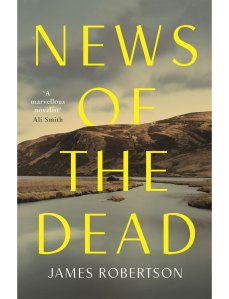More than anything, it is a book about stories. The stories we tell ourselves – how we construct history and our own reality. Robertson takes us from beautifully observed depictions of the best of humanity, to the horrors of war, to the petty preoccupations of everyday life.
Author: James Robertson
In present day Scotland, in a small glen somewhere near Forfar, a young boy called Lachie sees a ghost. He doesn’t want to tell his family, who probably won’t take him seriously or even listen. So, he goes to visit one of his best friends, an old lady called Maja. He knows she’ll listen without judging, interrupting or pushing him to say more than he wants to. And also, she’ll have biscuits.
So begins News of the Dead, the Walter Scott prize-winning novel by James Robertson. This book is the definition of epic – we have three narratives spread over three different millennia to contend with here. But Robertson is king of the microcosm – his brilliance is in the way he takes huge themes and timespans, and channels them into moments we can understand, people we can care about, and a place we grow to love.
The oldest section of the story takes us back to ancient Pictland and the coming of Christianity when the saint who isn’t really a saint – Conach – comes to the glen that will bear his name. Or does he? Indeed, did Conach even exist?
News of the Dead employs a deliciously layered approach to story – Conach’s life was supposedly documented in a book that no longer exists. We only have a work claiming to be its translation courtesy of a highly unreliable nineteenth century antiquarian called Charles Kirkliston Gibb.
The second narrative is Gibb’s diary – the story of his journey to Glen Conach to stay at the big house with the baron and his family, and translate this mysterious old book.
And the third is Maja’s story – the oldest lady in the glen, now reading this old diary and talking to Lachie about ghosts. Maja brings us right up to date in Glen Conach, complete with Covid and the lockdowns of 2020.
This book is a masterpiece. I do not use that word lightly.
It is a reflection on time and place, and what it means to be home. But more than anything, it is a book about stories. The stories we tell ourselves – how we construct history and our own reality. Robertson takes us from beautifully observed depictions of the best of humanity, to the horrors of war, to the petty preoccupations of everyday life – and it’s all done seamlessly.
I laughed my head off, I cried many times, and I learnt a huge amount. Oh yes indeed, it’s a masterpiece.


That sounds just up my street, thanks for the review. I’ve ordered it 🙂
LikeLiked by 1 person
I hope you enjoy!
LikeLiked by 1 person